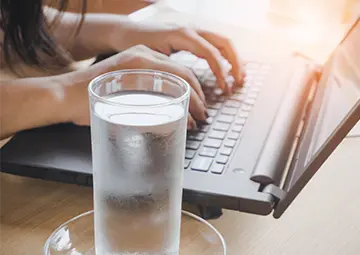Does Water Reduce Stress? Stress Awareness Month 2022
April is Stress Awareness Month, and this year's theme is Community. Given that the last two years have been particularly challenging, with many feeling the isolation, community is more important than ever. The pandemic has caused a 25% increase in of anxiety and depression, which is unsurprising as many people have been working remotely, and miss the social interaction and 'water cooler moments' of working in the office. Other stressors affecting people currently include uncertainty around wearing masks, going to large events, coupled with the fears of infection for themselves and family members.
Stress is the body's reaction to situations and environments that we perceive as harmful, whether they're real or imagined. It's how our bodies react to feeling overwhelmed by pressures we're experiencing. Certain levels of stress are normal, however, prolonged high levels of stress can be very damaging.
The pandemic restrictions are easing, however, new stressors are emerging, with rising prices and global unease. All of this could be contributing to the increased stress people are feeling.
Stress can cause both emotional symptoms, such as heightened irritability, as well as physical symptoms that can manifest into health issues.
Here are some health issues caused by stress:
- Headaches
- Heart Disease
- Diabetes
- Stomach problems
- Insomnia
- Heartburn

How Can Drinking Water Reduce Stress?
You may be wondering, how does staying hydrated reduce stress? Studies have shown that dehydration results in a rise in cortisol levels, the stress hormone, so not only does dehydration affect your physical health, it affects your mental health too. It is also cyclical in nature. The more stressed people are, the less they drink, causing dehydration, which then affects their mental health...
With all this cortisol flooding our brains, it's not surprising that many people forget to drink the right amount of water. According to our recent report, 33% of those we surveyed drink less than 4 glasses of water per day, with some saying that they drink less water when working from home as in the office they take turns to make each other drinks. It also emerged that the majority found that they missed the social aspects of working in an office as they work more from home.
Tips to increase water consumption
- Set a realistic daily goal - don't make your goal too hard to achieve, or you'll be destined to fail
- Keep a reusable water bottle with you & full - when you notice it's getting empty, refill it. Keep that water flowing
- Set reminders - Our memory often fails us, especially if we're feeling stressed or dehydrated. Take the burden off yourself by setting a reminder on your phone to drink water!
- Replace drinks with water - instead of reaching for that fizzy drink, get a drink of water
- Drink a glass of water before each meal
- Drink water when you get up & before bed - if you have set times where you drink water, it'll be easier to remember to drink it
Share this post to help us increase public awareness this Stress Awareness month, and make sure you drink enough water!

